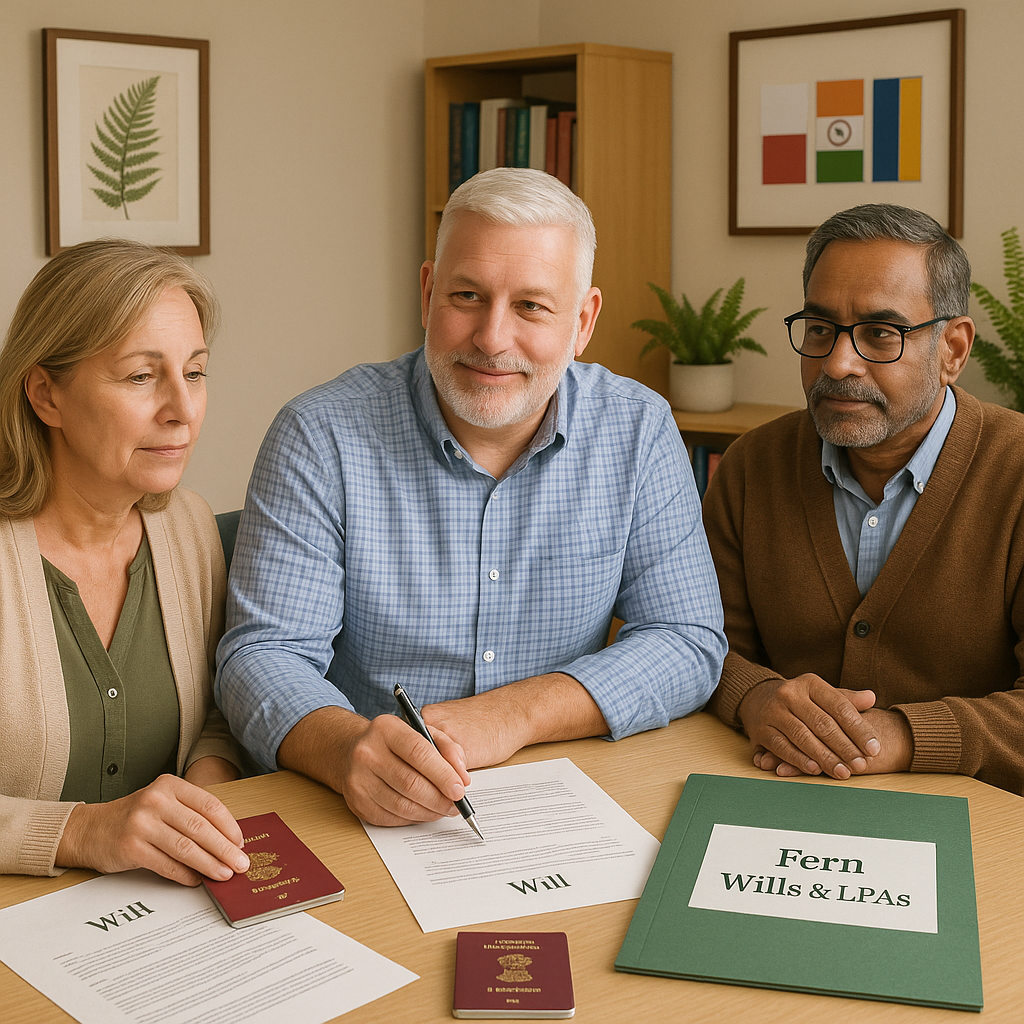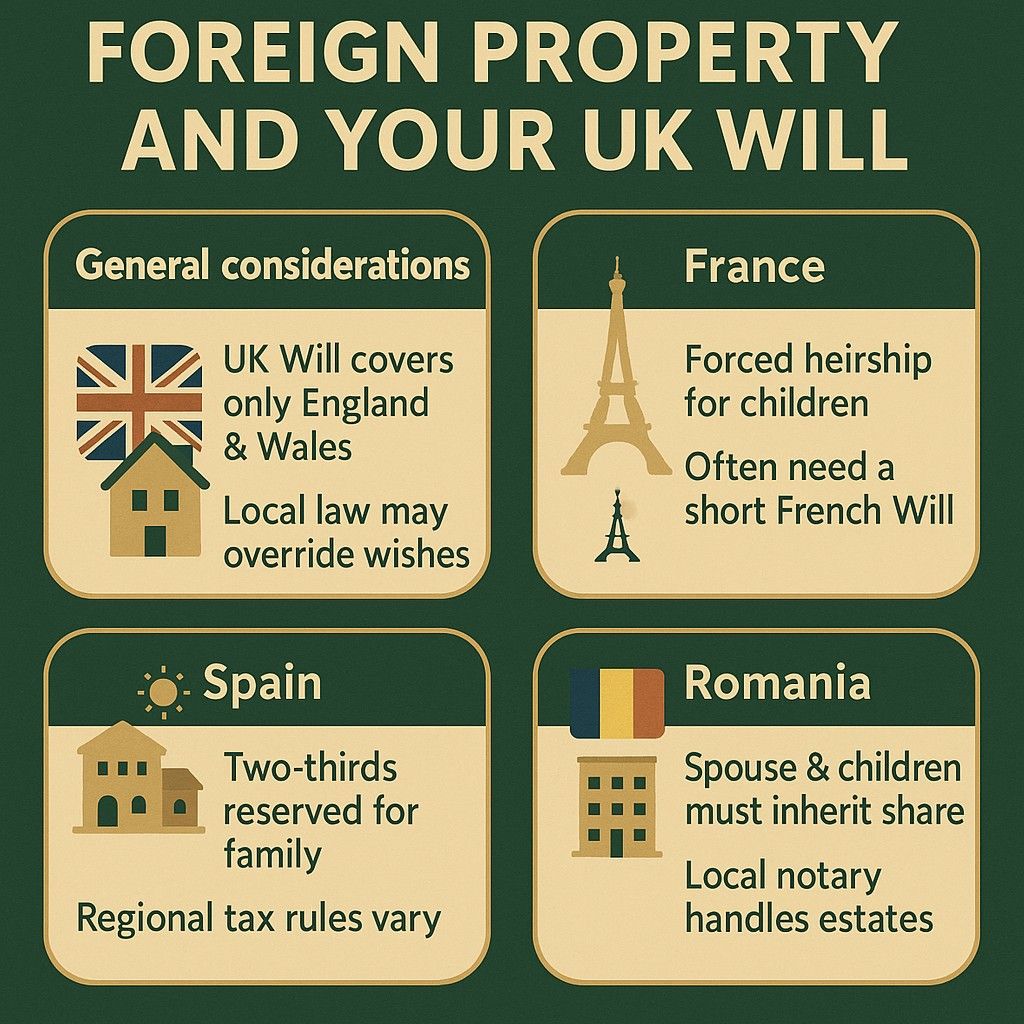Foreign Property and Assets in Your UK Will

Fern Wills & LPAs – Guide
Last verified: 17 September 2025 (England & Wales)
Quick-read summary
Owning property or assets outside England & Wales raises important questions when making your Will. A UK Will typically covers your estate here, but overseas property and bank accounts are often subject to local rules.
This guide explains:
- The general issues you should consider.
- How your English Will can work alongside a local Will.
- Specific points for France, Spain, and Romania.

Note:
This guide is for background only. Fern Wills & LPAs does not provide foreign legal advice. Always consult a qualified Will Writer in the country where your property is located.
Contents
- General considerations for any foreign property or assets
- France
- Spain
- Romania
- Looking for another country?
- Sources & further reading
General considerations for any foreign property or assets
- A UK Will only directly applies to property and assets in England & Wales.
- Foreign law may override your wishes. Some countries have “forced heirship” rules that automatically give part of your estate to certain family members.
- You may need a second Will abroad. The usual solution is:
- An English Will dealing only with your assets in England & Wales.
- A separate local Will dealing only with your assets in that country.
- Clauses we can add to your UK Will:
- Confirmation that your English Will does not revoke any foreign Wills.
- A jurisdiction clause clarifying that the Will applies only to England & Wales.
- Risks of ignoring this:
- Delays in probate.
- Disputes over which law applies.
- Potential double taxation.
- Other overseas assets. The same principles apply to foreign bank accounts, shares or investments. An English Will can cover them, but local rules and taxes may still apply, so a local Will or local advice is often recommended.
- Next steps: always take specialist advice abroad (for example, a notaire in France or an abogado in Spain).

At a glance — key points if you own property or assets abroad, with examples from France, Spain and Romania.
France
France has distinctive inheritance laws that often surprise UK clients.
Key points:
- Forced heirship. Children are automatically entitled to a share of your estate in France, regardless of what your English Will says.
- Spouse’s rights. A surviving spouse may choose between inheriting 25% outright or having a “life interest” (known in France as usufruit, or usufruct in English) in the whole estate.
- Practical solution. Make an English Will that does not revoke foreign Wills, then prepare a short French Will to cover your French property.
- Tax treatment. Transfers to a spouse are tax-free in France. Children have allowances (currently around €100,000 per child), with tax of 5–45% beyond that.
Optional technical notes (for those who want the detail…)
- Reserved portion (réserve héréditaire):*
- 1 child → at least 50% of the estate.
- 2 children → at least two-thirds.
- 3+ children → at least three-quarters.
- Quotité disponible: the remaining free portion you can leave as you choose.
- EU Succession Regulation (Brussels IV):* In theory, you can elect UK law to govern your French property. In practice, notaires vary in how far they accept this, and forced heirship may still apply.
- Administration:* successions in France are handled by a local notaire, not the UK probate registry.
Spain
Spain also has strict rules on who must inherit.
Key points:
- Forced heirship. Two-thirds of your Spanish estate must go to children or other close relatives.
- Variation by region. Some autonomous communities (e.g. Catalonia, Navarre) apply slightly different rules.
- Practical solution. Often advisable to make a short Spanish Will alongside your English Will.
- Tax treatment. Inheritance tax rates and allowances vary by region; in some areas they can be very generous for spouses and children.
Optional technical notes (for those who want the detail…)
- Distribution: typically one-third to be divided equally among children, one-third distributed as you choose among children, and the final third (“free disposal”) to anyone.
- Foreign nationals: Brussels IV may allow an election of UK law, but local practice can be inconsistent.
- Administration: successions usually handled through a Spanish notary (notario).
Romania
Romania follows a civil law system similar to France and Spain.
Key points:
- Forced heirship. Spouses, children, and sometimes parents must receive a reserved portion of the estate.
- Practical solution. A Romanian Will is usually required if you own property there.
- Tax treatment. Inheritance tax is generally low or nil for close family, but rules can change.
Optional technical notes (for those who want the detail…)
- Reserved portion: surviving spouse and descendants are protected heirs; exact shares depend on family structure.
- Administration: successions in Romania are overseen by a notary public (notar).
- Cross-border issues: Romania applies its own succession law to property located there, even if you have an English Will.
Looking for another country?
This guide covers France, Spain and Romania, as these are the situations I most often see. If you’d like similar information for another country, just let me know — I’ll point you in the right direction and make sure your UK Will is written properly.
Sources & further reading
- UK Government: https://www.gov.uk/make-will-property-abroad
- European Commission: https://justice.ec.europa.eu/european-commission/en/consumer-protection/justice-and-fundamental-rights/civil-justice/civil-justice-in-the-eu/succession-law
- French Government (service-public.fr): https://www.service-public.fr/particuliers/vosdroits/F1190
- Spanish Notaries: https://www.notariado.org
- Romanian Notaries: https://www.uniuneanotarilor.ro
© Fern Wills & LPAs 2025. This guide is provided for general information only and must not be relied upon as legal advice. Always take specialist advice in the relevant country.
Comments


